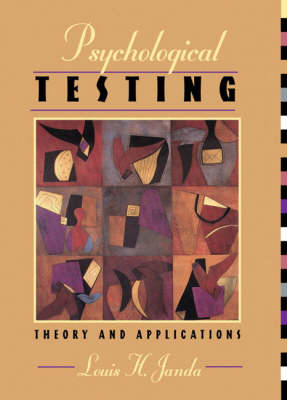
Psychological Testing
Pearson (Verlag)
978-0-205-19434-6 (ISBN)
- Titel ist leider vergriffen;
keine Neuauflage - Artikel merken
Psychological Testing: Theory, And Applications prepares students to quantify observations through the use of psychological tests. This new title is the first psychological testing book to devote forty percent of its coverage to psychometric theory. In a detailed account, Professor Janda explains why measurement is critical to all sub-areas of psychology. The developing psychologist is concerned with measuring children's intelligence, creativity, and moral development. The counseling psychologist is committed to using tests to help clients learn what career choices offer the best match with their interests and abilities. The educational psychologist must measure how much learning has occurred in the past and the types of educational experiences that can facilitate future learning. Personality and social psychologists find it necessary to develop new measures to allow them to investigate their current theories and constructs. The I/O psychologist predicts and measures job performance, and clinical psychologists want to assess psychopathology and predict response to treatment. Even experimental psychologists utilize psychological tests to study phenomena such as brain-behavior relationships. The author conveys how these principles are used to develop tests and how reviewers rely on them to evaluate tests. Every text comes with FREE Student Tutorial on disk.
In an engaging and accessible writing style, students will grasp the psychometric principles easily. Students will benefit from Professor Janda's sound, practical advice for evaluating and selecting tests, as well as how to achieve test results that affect their lives. The text unfolds with coverage of the specialty areas in psychology. Secondly, the book discusses the extent to which tests are actually used. By utilizing Psychological Testing, Theory, and Applications, students will gain an appreciation and an understanding of how psychological tests impact society.
All chapters begin with “Learning Objectives,” and conclude with “Summary.”
1.An Introduction to Psychological Testing.
Historical Milestones in Psychological Testing.
The Characteristics of Psychological Testing.
Sources of Information About Tests.
Psychological Testing and Ethics.
2.Measurement and Statistics.
Scales of Measurement.
Statistics.
3.Norms and the Meaning of Test Scores.
Types of Norms.
Fixed Reference Group.
Criterion Referenced Testing.
Evaluating Information About Norms.
4.Reliability.
Test Score Theory.
Test-Retest Reliability.
Alternate Form Reliability.
Measures of Internal Consistency.
Inter-Scorer Reliability.
The Standard Error of Measurement.
The Standard Error of the Difference.
Reliability and the Nature of the Sample.
Reliability and Validity.
5.Validity.
Content-Related Validity.
Criterion-Related Validity.
Construct Validity.
Is It All Construct Validity?
Face Validity.
6.Interpreting Validity Coefficients and Decision Making.
The Standard Error of Estimate.
Restricted Ranges.
Non-Linear Relationships.
Combining Information from Several Tests.
Using Tests to Make Decisions.
7.Item Analysis.
Difficulty Level.
Item Discriminability.
Item Response Theory.
8.Test Construction.
Writing Items.
Constructing a Psychological Test.
Approaches to Test Construction.
9.Individual Test of Intelligence.
The Stanford-Binet.
Administration and Scoring of the Stanford-Binet.
The Wechsler Intelligence Scales.
The Wide Range Achievement Test 3 (WRAT3).
Measure of Infant Intelligence.
Alternative Measures of Intelligence.
Resuming the Search for Facilities.
Why Measure Intelligence?
10.Group Ability Tests.
Achievement, Aptitude, and Intelligence.
Group Intelligence Tests.
Achievement Tests.
Aptitude Tests.
Coaching and Performance on Tests on Academic Ability.
11.Issues in Ability Testing.
The Structure of Intelligence.
Bias and Fairness in Ability Testing.
Culture-Fair Tests.
12.Measures of Interests, Attitudes, and Values.
Measure of Interests.
Measures of Attitudes.
Measure of Values.
13.Structured Measures of Personality.
The MMPI.
The Millon Clinical Multiaxial Inventory-III.
The California Psychological Inventory.
Personality Tests for Children.
Factor Analysis and Personality Tests.
Why Not Just Ask?
Final Thoughts About Structured Personality Tests.
14.Projective Tests and Clinical Assessment.
The Rorschach.
The Thematic Apperception Test (TAT)
The Bender Visual-Motor Gestalt Test.
Drawing Techniques.
The Rotter Incomplete Sentences Blank.
The Clinical Test Battery.
15.Testing in Business and Industry.
Predicting Performance.
Criterion Measurement.
Legal Issues in Employment Testing.
16.Alternative Approaches to Assessment.
Behavioral Approaches to Assessment.
Physiological Methods of Assessment.
Assessment of Environments.
17.Neuropsychological Assessment and Testing Special Populations.
General Screening Tests.
Neuropsychological Tests.
Neuropsychological Test Batteries.
Testing Special Populations.
18.A Few Thoughts About Tests, Society and the Future.
Tests of Cognitive Ability.
Testing in Clinical Psychology.
Testing in Education.
Testing in Business and Industry.
The Relevance of Psychological Testing.
APPENDIXES
COMPUTERIZED TUTORIAL FOR STUDENTS
Introduction.
Getting Started.
Overview of the Testing Tutor.
Exercises in the Testing Tutor.
The Computerized Study Guide.
References.
Index.
| Erscheint lt. Verlag | 19.1.1998 |
|---|---|
| Sprache | englisch |
| Maße | 242 x 185 mm |
| Gewicht | 890 g |
| Themenwelt | Geisteswissenschaften ► Psychologie ► Test in der Psychologie |
| ISBN-10 | 0-205-19434-6 / 0205194346 |
| ISBN-13 | 978-0-205-19434-6 / 9780205194346 |
| Zustand | Neuware |
| Haben Sie eine Frage zum Produkt? |
aus dem Bereich


